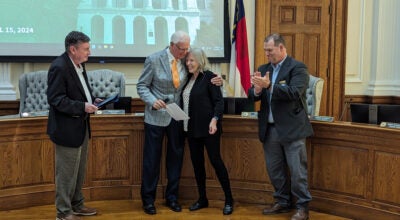WikiLeaks: Snowden going to Ecuador to seek asylum
Published 12:00 am Monday, June 24, 2013
WASHINGTON (AP) — Admitted leaker Edward Snowden took flight Sunday in evasion of U.S. authorities, seeking asylum in Ecuador and leaving the Obama administration scrambling to determine its next step in what became a game of diplomatic cat-and-mouse.
The former National Security Agency contractor and CIA technician fled Hong Kong and arrived at the Moscow airport, where he planned to spend the night before boarding an Aeroflot flight to Cuba. Ecuador’s Foreign Minister Ricardo Patino said his government received an asylum request from Snowden, and the anti-secrecy group WikiLeaks said it would help him.
“He goes to the very countries that have, at best, very tense relationships with the United States,” said Rep. Ileana Ros-Lehtinen, R-Fla., adding that she feared Snowden would trade more U.S. secrets for asylum. “This is not going to play out well for the national security interests of the United States.”
The move left the U.S. with limited options as Snowden’s itinerary took him on a tour of what many see as anti-American capitals. Ecuador in particular has rejected the United States’ previous efforts at cooperation, and has been helping WikiLeaks founder, Julian Assange, avoid prosecution by allowing him to stay at its embassy in London.
Snowden helped The Guardian and The Washington Post disclose U.S. surveillance programs that collects vast amounts of phone records and online data in the name of foreign intelligence, but often sweeping up information on American citizens. Officials have the ability to collect phone and Internet information broadly but need a warrant to examine specific cases where they believe terrorism is involved.
Snowden has been in hiding for several weeks in Hong Kong, a former British colony with a high degree of autonomy from mainland China. The United States formally sought Snowden’s extradition from Hong Kong but was rebuffed; Hong Kong officials said the U.S. request did not fully comply with their laws.
The Justice Department rejected that claim, saying its request met all of the requirements of the extradition treaty between the U.S. and Hong Kong.
During conversations last week, including a phone call Wednesday between Attorney General Eric Holder and Hong Kong Secretary for Justice Rimsky Yuen, Hong Kong officials never raised any issues regarding sufficiency of the U.S. request, a Justice spokesperson said.
A State Department official said the United States was in touch through diplomatic and law enforcement channels with countries that Snowden could travel through or to, reminding them that Snowden is wanted on criminal charges and reiterating Washington’s position that Snowden should only be permitted to travel back to the U.S.
The Justice Department said it would “pursue relevant law enforcement cooperation with other countries where Mr. Snowden may be attempting to travel.”
The White House would only say that President Barack Obama had been briefed on the developments by his national security advisers.
Russia’s state ITAR-Tass news agency and Interfax cited an unnamed Aeroflot airline official as saying Snowden was on the plane that landed Sunday afternoon in Moscow.
Upon his arrival, Snowden did not leave Moscow’s Sheremetyevo Airport. One explanation could be that he wasn’t allowed; a U.S. official said Snowden’s passport had been revoked, and special permission from Russian authorities would have been needed.
“It’s almost hopeless unless we find some ways to lean on them,” said Rep. Peter King, R-N.Y.
The Russian media report said Snowden intended to fly to Cuba on Monday and then on to Caracas, Venezuela.
U.S. lawmakers scoffed. “The freedom trail is not exactly China-Russia-Cuba-Venezuela, so I hope we’ll chase him to the ends of the earth, bring him to justice and let the Russians know there’ll be consequences if they harbor this guy,” said Sen. Lindsey Graham, R-S.C.
With each suspected flight, efforts to secure Snowden’s return to the United States appeared more complicated if not impossible. The United States does not have an extradition treaty with Russia, but does with Cuba, Venezuela and Ecuador. Even with an extradition agreement though, any country could give Snowden a political exemption.




